人教版新目标版八年级英语下册Unit4 Why don’t you talk to your parentsSection A Grammar Focus-4c教案
2020年人教版新目标 英语 八年级下册 Unit 4 Why don’t you talk
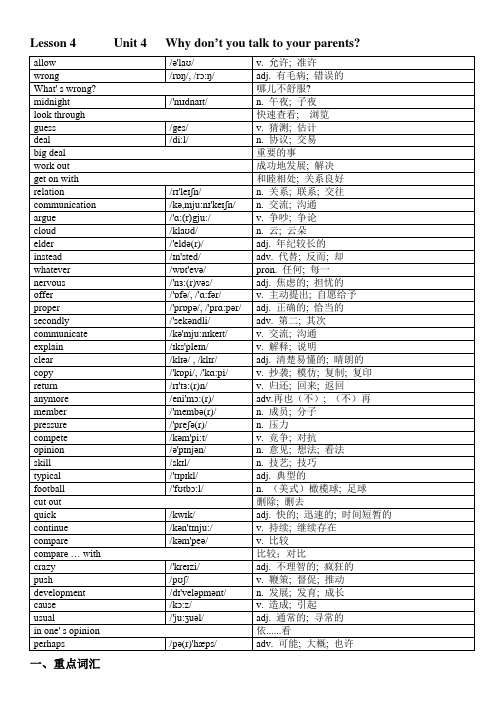
Lesson 4 Unit 4 Why don’t you talk to your parents?一、重点词汇1. allow v.允许;准许allow sb to do sth ; allow doing sth;be (not) allowed to do妈妈允许我周末看电视。
My mother allows me to watch TV on weekends.不允许在教室吃饭。
We don’t allow eating in the classroom.2.deal n.a great deal of time许多He was trying to make a deal with them.交易v. 处理,多与with连用相关词组:a good/great deal很多It' s a deal.就这么定了 a big deal大事deal with常与how连用do with常与what连用3.Look through浏览,快速查看含look的常用短语:look up;look at; look out; look for; look after; look like; look around; look down on/ upon; look over 4.argue v.争论argument n.Argue with sb = have an argument with sb 与某人争辩Argue on / about sth 辩论某事Argue with sb about sth为某事与某人争论我和她争论哪个队伍会赢。
I’m arguing with her about which team will win.5.Offer v.&n.提供Offer to do sth主动提出做某事;offer sb sth = offer sth to sb 提供某人某物他主动提出借我几本书。
人教版英语八年级下册Unit 4 Why don’t you talk to your parent

2019-2020学年人教版英语八年级下册Unit 4 Why don’t you talk to your parents?课文知识点总结Section A1.Why don’t you talk to your parents? 你为什么不和你打父母谈谈呢?【解析】Why don't you do sth ?= Why not do sth? 为什么不......呢?【拓展】用于提建议的句型有:(1)What about doing sth ?=How about doing sth? ….怎么样?(2)Why don’t you do sth?= Why not do sth? 为什么不呢?(3)Let’s do sth.让我们一起做某事吧。
(4)Shall we/I do sth?我们做…好吗?(5)had better do/not do sth 最好做/不做某事(6) Will/Would you please do sth 请你做…好吗?(7) Would you like to do sth? 你想去做某事吗?(8)Would you mind doing sth?你介意做某事吗?【回答】(1). 同意对方的建议时,一般用:◆Good idea./ That’s good idea. 好主意◆OK/ All right./ Great 好/ 行/太好了◆Yes, please ./ I’d love to 是的/ 我愿意◆I agree with you 我同意你的看法◆No problem 没问题◆Sure/ Of course/ Certainly 当然可以◆Yes, I think so 对,我也这样想(2).对对方的帮助或要求表示委婉谢绝时,一般用:◆I don’t think so 我认为不是这样◆Sorry, I can’t 对不起,我不能◆I’d love to, but…◆I’m afraid…我愿意,但恐怕……2.I have to study too much so I don’t get enough sleep.我要学的太多,因此我睡眠不足。
人教版八年级英语下册Unit 4 Why don’t you talk to your parent

1. Why don’t you talk to your parents? 为什么不跟你的父母谈谈呢?
【自主领悟】(1)Why don’t you do sth. ? 这是一个否定疑问 句, “为什么不……? ”常用来征求意见和提出建议, 相当于 Why not do sth. ? 句式。例如: Why don’t you go with us? = Why not go with us? 为什么不同我们一起去呢? (2)talk to sb. 意为“同某人谈话”。例如: He talked to me about my study. 他跟我谈了关于我的学习的事情。
Unit 4 Why don’t you talk to your parents?
Section A (1a-2d)
Ⅰ. 短语互译 1. get enough sleep 2. have a fight with sb. 3. look through 4. hang out 5. 把……归还给…… 6. 允许某人干某事 7. 成功地发展; 解决 答案: 1. 有足够的睡眠 2. 跟某人打架 3. 浏览 4. 闲逛 5. give. . . back to. . . 6. allow sb. to do sth. 7. work out
【归纳拓展】allow的不同搭配 (1)allow sth. /doing sth. 允许(做)某事 例如: We don’t allow eating in the classroom. 我们不允许在教室里吃饭。 (2)allow sb. sth. (双宾语)给予某人某物 例如: He allows his son too much money. 他给他儿子太多的钱。
speak to sb. “跟某人讲话”
八年级英语下册 Unit 4 Why don’t you talk to your parents短语、句型、作文汇总 (新版)人教新目标版

Unit 4 Why don’t you talkto your parents?【重点单词】allow [əˈlaʊ] v. 允许,准许wrong [rɔŋ] adj. 错误的What's wrong? 哪儿不舒服?midnight ['mɪdnaɪt] n. 午夜,子夜look through 浏览,快速查看guess [ɡes] v. 猜测,估计deal [di:l] v. 处理,应付big deal 重要的事work out 成功地发展,解决get on with 和睦相处,关系良好relation [rɪˈleɪʃn] n. 关系,联系,交往communicate [kəˈmju:nikeit] v. 沟通,通信,通讯communication [kəˌmju:nɪˈkeɪʃn] n. 交流,沟通argue [ˈɑ:ɡju:] v. 争论,争吵cloud [klaʊd] n. 云elder ['eldə(r)] adj. 年级较长的instead [ɪnˈsted] adv. 代替whatever [wɒtˈevər] pron. 任何,不管什么,无论什么nervous [ˈnə:vəs] adj. 紧张不安的offer ['a:fər] v. 提供,自愿给予proper [ˈprɔpə] adj. 合适的,适当的secondly [ˈsekəndli] adv. 第二,其次explain [ɪkˈspleɪn] v. 讲解,解释,说明clear [klɪə] adj. 清晰的,清楚易懂的copy [ˈkɔpi] v. 复制return [rɪ'tɜ:n] v. 回来,返回,归还anymore ['enɪmɔ:] adv. 不再,再也不member [ˈmembə] n. 成员,会员pressure ['preʃə(r)] n. 压力compete [kəm'pi:t] v. 比赛,竞争opinion [əˈpɪnjən] n. 意见,想法,看法skill [skɪl] n. 技能,技巧typical [ˈtɪpɪkl] adj. 典型的football [ˈfʊtbɔ:l] n. 足球cut out 删去,删除quick [kwɪk] adj. 快的,迅速的continue [kənˈtɪnju:] v. 继续,连续compare [kəm'peə] v. 比较compare…with 比较,对比crazy [ˈkreɪzɪ] adj. 疯狂的,狂热的development [diˈveləpmənt] n. 发育,成长,发展cause [kɔ:z] n. & v. 原因;造成,使发生usual [ˈju:ʒuəl] adj. 通常的,平常的in one's opinion 依… 看perhaps [pəˈhæps] adv. 可能,大概,也许【重点语法】在英语中,表示建议的说法有很多,而且都是中考考查的重点。
人教版八年级英语下册《Unit4 Why don’t you talk to your parent

人教版八年级英语下册《Unit4 Why don’t you talk to your parents》教学设计(第5课时)一. 教材分析人教版八年级英语下册《Unit4 Why don’t you talk to your parents》是本单元的第五课时,主要围绕着如何向父母提出建议展开。
本课时包含两个部分:part A 和part B。
part A包含一个听力活动,一个读写任务和一个口语练习;part B包含一个读写任务和一个口语练习。
本课时旨在帮助学生掌握向父母提出建议的策略,提高他们的听说读写能力。
二. 学情分析学生在之前的学习中已经掌握了如何提出建议的基本句型“Why don’t you…?”和“You should….”,但还需要在实际情境中进行运用和提高。
此外,学生在听力、口语、阅读和写作方面需要进一步的加强和巩固。
三. 教学目标1.知识目标:(1)能够听懂、会说、会读、会写本课时所学的单词和短语。
(2)能够运用所学句型提出建议,并进行简单的交流。
2.能力目标:(1)提高学生的听力能力。
(2)提高学生的口语表达能力。
(3)提高学生的阅读和写作能力。
3.情感目标:(1)培养学生积极主动与父母沟通的习惯。
(2)培养学生珍惜友谊,关心他人的品质。
四. 教学重难点(1)掌握本课时所学的单词和短语。
(2)运用所学句型提出建议,并进行简单的交流。
(1)如何准确地运用听力技巧获取信息。
(2)如何准确地运用阅读技巧获取信息。
五. 教学方法1.任务型教学法:通过完成各种任务,激发学生的学习兴趣,提高学生的学习积极性。
2.情境教学法:通过设定真实的情境,让学生在实际情境中学习和运用英语。
3.交际型教学法:通过小组讨论、角色扮演等方式,培养学生的交际能力。
六. 教学准备1.教材:人教版八年级英语下册《Unit4 Why don’t you talk to your parents》。
2.课件:根据教学内容制作的课件。
人教版英语(八年级下册Unit4 Why dont you talk知识梳理讲解及练习

Unit4 Why don't you talk to your parents?【重点单词】1.have free time有空闲时间2.allow sb. to do sth. 允许某人做某事3.hang out with sb. 与某人闲逛4. after-school classes课外活动课5. get into a fight with sb.与某人吵架/打架6. until midnight直到半夜7. talk to sb. 与某人交谈8. too many太多9. study too much学得过多10. get enough sleep有足够的睡眠11. write sb. a letter给某人写信12. call sb. up打电话给某人13. surprise sb. 令某人惊讶14. look through翻看15. be angry with sb. 生某人的气16. a big deal重要的事17. work out成功地发展;解决18. get on with与...相处19. fight a lot经常吵架/打架20. hang over笼罩21. refuse to do sth. 拒绝做某事22. offer to do sth. 主动提出做某事23. so that以便24. mind sb. doing sth. 介意某人做某事25. all the time一直26. in future今后27. make sb. angry使某人生气28. worry about sth. 担心某事29. copy one’ s homework抄袭某人的作业30. be oneself做自己31. family members32. spend time alone独自消磨时光33. give sb. pressure给某人施压34. have a fight with sb. 与某人吵架35. compete with sb. 与某人竞争36. free time activities业余活动37. get better grades取得更好的成绩38. give one’ s opinion提出某人的观点39. learn exam skills学习应试技巧40. practice sports体育训练41. cause stress造成压力42. cut out删除【重点句型】1. I studied until midnight last night so I didn't get enough sleep. 我昨晚学习到半夜所以睡眠不足。
人教目标版八年级下册Unit4 Why don’t you talk to your parents

If you’re Linda Miller. Tell us your opinion about after-school classes.
I don’t really agree that children should take after-school classes. I think(In my opinion, )it’s crazy/unfair for children to…. I believe it is better if parents …. People shouldn't....
Why don’t they let their kids be kids?
7. 医生们说太多的压力不利于孩子们的成长。
Doctors say too much pressure is not good for a child's development.
8. 所有这些活动会给孩子们导致很大的压力。
Unit 4 Why don’t you talk to
your parents? Period5
1. 家庭成员 2. 独自消磨时光 3. 给某人那么多的压力 4. 与某人竞争 5. 取得更好的成绩 6. 业余活动 7. 互相
family members spend time alone give sb. so much pressure compete with sb. get better grades free time activities each other
The most common activity I want to do is that …
人教新目标版英语八下Unit4《Whydon’tyoutalktoyourparents》说课稿

人教新目标版英语八下Unit 4《Why don’t you talk to your parents》说课稿一. 教材分析人教新目标版英语八下Unit 4主要讨论了如何与父母沟通的问题,通过本节课的学习,学生能够掌握一定的沟通技巧,提高与父母交流的能力。
本单元的主题贴近学生的生活,有利于激发学生的学习兴趣和积极性。
二. 学情分析根据我对学生的了解,他们在学习过程中已经掌握了基本的英语语法和词汇,具备一定的听说读写能力。
但部分学生在与父母沟通方面存在一定的困扰,可能因为害羞、害怕被批评等原因而不愿意与父母交流。
因此,本节课的教学目标在于帮助学生克服这些障碍,提高他们的沟通能力。
三. 说教学目标1.知识目标:学生能够掌握本节课的重点词汇和句型,如“Why don’tyou…?”,“Because…”等,并能够运用这些词汇和句型进行简单的交流。
2.能力目标:学生能够通过听力、口语、阅读和写作等多种方式,提高自己的英语应用能力。
3.情感目标:学生能够认识到与父母沟通的重要性,学会尊重和理解父母,提高与父母相处的质量。
四. 说教学重难点1.重点:本节课的重点是让学生掌握并运用句型“Why don’t you…?”和“Because…”进行交流。
2.难点:如何帮助学生克服害羞、害怕被批评等心理障碍,提高他们与父母沟通的勇气和信心。
五. 说教学方法与手段1.任务型教学法:通过设计各种真实的任务,让学生在完成任务的过程中运用所学知识,提高英语实际应用能力。
2.情境教学法:创设各种与父母沟通的情境,让学生在模拟实践中学会如何与父母交流。
3.小组合作学习:通过小组讨论、分享等方式,促进学生之间的互动,提高他们的合作能力和沟通能力。
六. 说教学过程1.导入:通过一个关于父子间沟通的小故事,引发学生对与父母沟通的思考,激发他们的学习兴趣。
2.呈现:介绍本节课的主题,展示相关的词汇和句型,让学生初步感知和学习。
3.实践:设计各种与父母沟通的情境,让学生在模拟实践中运用所学知识。
人教新目标八年级英语下册Unit4Whydon'tyoutalktoyourparents说课稿

人教新目标八年级英语下册Unit 4 Why don’t you talk to your parents说课稿一. 教材分析人教新目标八年级英语下册Unit 4 Why don’t you talk to your parents是一篇关于日常交流和沟通的文章。
本篇文章主要讲述了在遇到问题时,如何与父母沟通,寻求解决方案。
通过本节课的学习,学生能够掌握情态动词why not的用法,以及如何运用交际策略进行日常交流。
教材内容贴近学生生活,有利于激发学生的学习兴趣和积极性。
二. 学情分析八年级的学生已经掌握了基本的英语语法和词汇,具备一定的听说读写能力。
但在实际交流中,学生往往因为害羞、紧张等原因不敢开口说英语,本题正好可以引导学生学会如何与父母沟通,提高他们的交际能力。
同时,学生在这个年龄段开始关注家庭和社交问题,对本节课的内容会产生浓厚兴趣。
三. 说教学目标1.知识目标:学生能够掌握情态动词why not的用法,了解日常交际中的沟通策略。
2.能力目标:学生能够运用所学知识进行日常交流,提高口语表达能力。
3.情感目标:学生学会与父母沟通,增进家庭关系,培养良好的交际习惯。
四. 说教学重难点1.重点:情态动词why not的用法和日常交际策略。
2.难点:如何运用所学知识进行实际交流,克服羞涩、紧张等心理障碍。
五. 说教学方法与手段1.情景教学法:通过设定情景,让学生在实际语境中学习英语,提高交际能力。
2.任务型教学法:学生分组完成任务,激发学习兴趣,培养合作精神。
3.互动式教学法:教师与学生互动,引导学生积极参与课堂讨论,提高口语表达能力。
六. 说教学过程1.导入:用一段关于家庭沟通的短片引出本节课的主题,激发学生的学习兴趣。
2.新课呈现:教师展示文章,引导学生关注文章标题和关键词,预测文章内容。
3.课堂讲解:教师讲解情态动词why not的用法和日常交际策略,让学生通过例句理解并掌握。
4.实践环节:学生分组进行角色扮演,运用所学知识进行实际交流,教师巡回指导。
新目标英语八年级下册Unit4-Why-don't-you-talk-to-your-parents
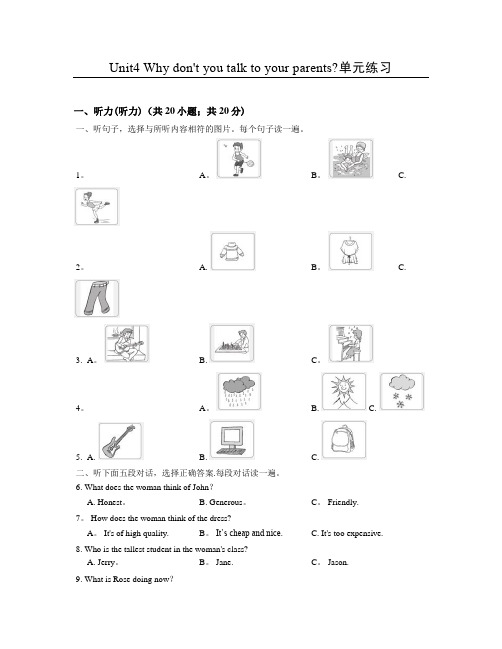
Unit4 Why don't you talk to your parents?单元练习一、听力(听力)(共20小题;共20分)一、听句子,选择与所听内容相符的图片。
每个句子读一遍。
1。
A。
B。
C. 2。
A. B。
C.3. A。
B. C。
4。
A。
B. C.5. A. B. C.二、听下面五段对话,选择正确答案.每段对话读一遍。
6. What does the woman think of John?A. Honest。
B. Generous。
C。
Friendly.7。
How does the woman think of the dress?A。
It's of high quality. B。
It’s cheap and nice. C. It's too expensive.8. Who is the tallest student in the woman's class?A. Jerry。
B。
Jane. C。
Jason.9. What is Rose doing now?A. Playing with her sisters.B. Watching a movie.C。
Doing her homework.10. Why is the woman asking for more hot water?A。
She is thirsty. B。
She hurt her feet. C。
It’s cold today.三、听下面两段对话,选择正确答案。
每段对话读两遍。
听第11段对话,回答第11至第12题。
11. What’s the matter with Lucy?A。
She speaks too much。
B。
She has a sore throat。
C. She drinks too much water.12. What should not Lucy have to do?A. Not to speak too much。
s2014春人教新目标英语八下_unit4why_don't_you_talk_to_yo

1e What is your advice for Wei Ming?
Tell your partner and say why.
A: I think Wei Ming should… B: Why? A: Because…
Talk about the problems below and ask your classmates for advice.
1d Listen again. What advice does Alice
give to Wei Ming? Fill in the blanks.
1. Although you may be ________ with your parents, you should talk to them. Ask them why they give you so much ________.
Unit 4
Why don't you talk to your parents?
Section B
Period 1 (1a-1e)
-.
New Words
member n. pressure n. compete v.
成员;分子 压力 竞争;对抗
What activities do you like to do to help lower your stress?
help lower your stress? Order them [1-8] with 1 being the most favorite thing you do to lower stress.
__________ play sports __________ hang out with friends __________ talk to parents or other family members __________ spend time alone
新目标八下Unit4Why_don't_you_talk_to_your_parents

not allow—— refuse
worried—— nervous
get along with—— get on with
按要求写句子: 1. 你为什么不给他那本书啊? Why don’t you give her a book? __________ 2. Why not come over to join us?(同义句) Why don’t you come over to join us? ______________ 3. How about the sweater?(同义句) ____ do you ________ What think of the sweater? 4. What‘s wrong?(同义句) the matter What’s ____________?
Dear Mr. Hunt, My problem is that I can’t get on with my family. Relations between my parents have 经常吵架 become difficult. They fight a lot, and I really don’t like it. It’s the only communication they have. I don’t know if I should say anything to them about this. When they argue, it’s like a big, argue with sb. black cloud hanging over our home. Also, my elder 笼罩 brother is not very nice to me. He always refuses to refuse to do sth. let me watch my favorite TV show. Instead he watches whatever he wants until late at night. I don’t think this is fair. At home I always feel lonely 感到孤独和紧张 and nervous. Is that normal? What can I do?
人教版(新目标)初中英语八年级下册Unit 4

Unit4 Why don't you talk to your parents?八年级下册Unit 4 单词来自初中英语人教版00:0003:37八年级下册Unit 4 Section A来自初中英语人教版00:0005:28八年级下册Unit 4 Section B来自初中英语人教版00:0004:24点击上方绿标即可收听音频◆◆◆Unit 4单词(音标)allow [əˈlaʊ] v. 允许,准许wrong [rɔŋ] adj. 错误的What's wrong? 哪儿不舒服?midnight ['mɪdnaɪt] n. 午夜,子夜look through 浏览,快速查看guess [ɡes] v. 猜测,估计deal [di:l] v. 处理,应付big deal 重要的事work out 成功地发展,解决get on with 和睦相处,关系良好relation [rɪˈleɪʃn] n. 关系,联系,交往communicate [kəˈmju:nikeit] v. 沟通,通信,通讯communication [kəˌmju:nɪˈkeɪʃn] n. 交流,沟通argue [ˈɑ:ɡju:] v. 争论,争吵cloud [klaʊd] n. 云elder ['eldə(r)] adj. 年级较长的instead [ɪnˈsted] adv. 代替whatever [wɒtˈevər] pron. 任何,不管什么,无论什么nervous [ˈnə:vəs] adj. 紧张不安的offer ['a:fər] v. 提供,自愿给予proper [ˈprɔpə] adj. 合适的,适当的secondly [ˈsekəndli] adv. 第二,其次explain [ɪkˈspleɪn] v. 讲解,解释,说明clear [klɪə] adj. 清晰的,清楚易懂的copy [ˈkɔpi] v. 复制return [rɪ'tɜ:n] v. 回来,返回,归还anymore ['enɪmɔ:] adv. 不再,再也不member [ˈmembə] n. 成员,会员pressure ['preʃə(r)] n. 压力compete [kəm'pi:t] v. 比赛,竞争opinion [əˈpɪnjən] n. 意见,想法,看法skill [skɪl] n. 技能,技巧typical [ˈtɪpɪkl] adj. 典型的football [ˈfʊtbɔ:l] n. 足球cut out 删去,删除quick [kwɪk] adj. 快的,迅速的continue [kənˈtɪnju:] v. 继续,连续compare [kəm'peə] v. 比较compare…with 比较,对比crazy [ˈkreɪzɪ] adj. 疯狂的,狂热的development [diˈveləpmənt] n. 发育,成长,发展cause [kɔ:z] n. & v. 原因;造成,使发生usual [ˈju:ʒuəl] adj. 通常的,平常的in one's opinion 依… 看perhaps [pəˈhæps] adv. 可能,大概,也许Unit4 课本教材Unit4 知识梳理【重点单词】1.have free time有空闲时间2.allow sb. to do sth. 允许某人做某事3.hang out with sb. 与某人闲逛4. after-school classes课外活动课5. get into a fight with sb.与某人吵架/打架6. until midnight直到半夜7. talk to sb. 与某人交谈8. too many太多9. study too much学得过多10. get enough sleep有足够的睡眠11. write sb. a letter给某人写信12. call sb. up打电话给某人13. surprise sb. 令某人惊讶14. look through翻看15. be angry with sb. 生某人的气16. a big deal重要的事17. work out成功地发展;解决18. get on with与...相处19. fight a lot经常吵架/打架20. hang over笼罩21. refuse to do sth. 拒绝做某事22. offer to do sth. 主动提出做某事23. so that以便24. mind sb. doing sth. 介意某人做某事25. all the time一直26. in future今后27. make sb. angry使某人生气28. worry about sth. 担心某事29. copy one’ s homework抄袭某人的作业30. be oneself做自己31. family members32. spend time alone独自消磨时光33. give sb. pressure给某人施压34. have a fight with sb. 与某人吵架35. compete with sb. 与某人竞争36. free time activities业余活动37. get better grades取得更好的成绩38. give one’ s opinion提出某人的观点39. learn exam skills学习应试技巧40. practice sports体育训练41. cause stress造成压力42. cut out删除【重点句型】1. I studied until midnight last night so I didn't get enough sleep. 我昨晚学习到半夜所以睡眠不足。
新人教版八年级英语下册Unit 4 Why don’t you talk to your parents 说课稿、教学设计及教后反思

Unit 4 Why don’t you talk to your parents? 说课稿一、教材分析(一)教材的地位和作用本课的中心话题是谈论同学们生活及学习中的问题和困难并提出合适的建议,从而展开教学活动。
学习本课的内容为整个单元打下基础,同时也是英语教学中拓展学生思维的重要环节。
(二)教学目标的确立和依据根据《新课程标准》的要求,为了完成正常的教学任务,有效地培养学生的自信,创新精神和合作互助的能力,我确立如下的教学目标:1、语言知识:学生能够使用以下词汇:too much, enough, allow, hang out, fight,wrong, midnight.句型:----What’s wrong?----I have to study too much so I don’t get enough sleep. ----Why don’t you talk to your parents?2、语言技能:(1)学完本课,让学生学会用英语说出学习和生活中的问题和困难,并能根据别人的问题给出合适的建议。
(2)能运用所学单词、短语及句型,结合实际生活进行灵活运用。
3、学习策略:(1)自主学习:要求学生采用自主学习的方式,能根据需要进行有目的的预习。
(2)合作学习:在活动中相互探讨,相互交流与合作,从而获得知识、技能和情感体验。
4、情感态度:(1)通过说出自己学习和生活中的问题和困难,让同学们学会释放压力,增加自信,热爱生活。
(2)通过给别人提建议,培养学生团结互助的精神,增进同学之间的感情。
5、文化意识:(1)了解中西方文化差异:我们比较委婉,而西方人则更直接一些,对学生进行不同文化意识的渗透。
(三)教学重点和难点:1.重点:让学生用英语说出学习和生活中的问题和困难,并且给出别人一些合适的建议,注意提建议的句型及用法和建议形式的多样化。
2.难点:用英语给出合适的建议是一大难点,词汇和短语搭配等基本功要扎实。
人教新目标英语八年级下册unit4单元知识讲解

2020年春人教新目标英语八年级下册Unit 4 Why don’t you talk to your parents? 话题:讨论问题,给予建议教学目标:○1能够掌握提出建议以及回答建议的表达方式重点:○1提建议以及回答建议的表达方式○2until, so that,although用法重点句型:What’s wrong? 怎么了?Why don’t you…? =Why not…? 为什么不……呢?知识点:1.提建议的表达○1why don’t…?/Why not…?后面接动词原形Why don’t you have a picnic with us?=Why not have a picnic with us?你为什么不和我们去野餐呢?○2how about/what about+doing sth○3You’d better do sth. 你最好做某事○4Let’s …shall we? Let’s 后面接动词原形,意为“咱们……,好吗?”○5shall we/I…?Shall we go boating?○6Would you like…?后接动名词或动词不定式,意为“你们/你想要……吗?”Would you like a cup of coffee?○7Would you please…? 后面接动词原形,意为“请你……好吗?回答对方的建议时,一般用:Good idea./ That’s a good idea.OK./All right.Yes, please. /I’d love to.No problem.I agree with you.Sure./ Of course. /Certainly.Yes, I think so./ I will.表示拒绝时,一般用:I don’t think so./ Sorry, I can’t. /Sorry, but…I’d love to/ like to, but…/I’m afraid…2.until○1作介词“直到……为止”The meeting may last until Friday.○2作连词,直到……为止,在……以前,不到……a.用于肯定句中Heat can be conducted from a hot body to a cooler one until both are at the same temperature.热量可以从一个热的物体传到一个较冷的物体,直到两者温度相同为止。
版新目标八年级下册英语unit4-why-don't-you-talk-to-your-parents重点知识讲解
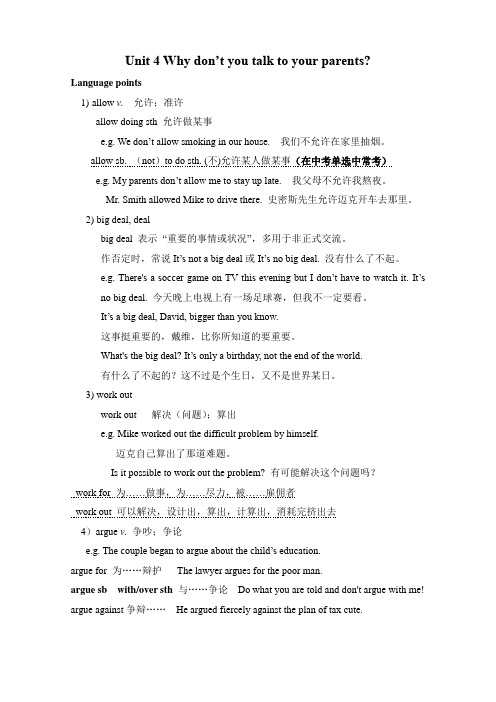
Unit 4 Why don’t you talk to your parents?Language points1)allow v. 允许;准许allow doing sth 允许做某事e.g. We don’t allow smoking in our house. 我们不允许在家里抽烟。
allow sb. (not)to do sth. (不)允许某人做某事(在中考单选中常考)e.g. My parents don’t allow me to stay up late.我父母不允许我熬夜。
Mr. Smith allowed Mike to drive there. 史密斯先生允许迈克开车去那里。
2) big deal, dealbig deal 表示“重要的事情或状况”,多用于非正式交流。
作否定时,常说It’s not a big deal或It’s no big deal.没有什么了不起。
e.g. There's a soccer game on TV this evening but I don’t have to watch it.It’sno big deal. 今天晚上电视上有一场足球赛,但我不一定要看。
It’s a big deal, David, bigger than you know.这事挺重要的,戴维,比你所知道的要重要。
What's the big deal? It’s only a birthday, not the end of the world.有什么了不起的?这不过是个生日,又不是世界某日。
3) work outwork out 解决(问题);算出e.g. Mike worked out the difficult problem by himself.迈克自己算出了那道难题。
Is it possible to work out the problem? 有可能解决这个问题吗?work for 为……做事,为……尽力,被……雇佣者work out 可以解决,设计出,算出,计算出,消耗完挤出去4)argue v. 争吵;争论e.g. The couple began to argue about the child’s ed ucation.argue for 为……辩护The lawyer argues for the poor man.argue sb with/over sth 与……争论Do what you are told and don't argue with me! argue against争辩……He argued fiercely against the plan of tax cute.5). proper adj.正确的;恰当的e.g. It’s not proper to visit a friend too late in the evening.太晚了,去看朋友不合适。
人教版英语八年级下册Unit 4 Why don’t you talk to your parents课文知识点总结

2019-2020学年人教版英语八年级下册Unit 4 Why don’t you talk to your parents?课文知识点总结Section A1.Why don’t you talk to your parents? 你为什么不和你打父母谈谈呢?【解析】Why don't you do sth ?= Why not do sth? 为什么不......呢?【拓展】用于提建议的句型有:(1)What about doing sth ?=How about doing sth? ….怎么样?(2)Why don’t you do sth?= Why not do sth? 为什么不呢?(3)Let’s do sth.让我们一起做某事吧。
(4)Shall we/I do sth?我们做…好吗?(5)had better do/not do sth 最好做/不做某事(6) Will/Would you please do sth 请你做…好吗?(7) Would you like to do sth? 你想去做某事吗?(8)Would you mind doing sth?你介意做某事吗?【回答】(1). 同意对方的建议时,一般用:◆Good idea./ That’s good idea. 好主意◆OK/ All right./ Great 好/ 行/太好了◆Yes, please ./ I’d love to 是的/ 我愿意◆I agree with you 我同意你的看法◆No problem 没问题◆Sure/ Of course/ Certainly 当然可以◆Yes, I think so 对,我也这样想(2).对对方的帮助或要求表示委婉谢绝时,一般用:◆I don’t think so 我认为不是这样◆Sorry, I can’t 对不起,我不能◆I’d love to, but…◆I’m afraid…我愿意,但恐怕……2.I have to study too much so I don’t get enough sleep.我要学的太多,因此我睡眠不足。
人教新目标八年级英语下册Unit4-Why-don't-you-talk-to-your-paren
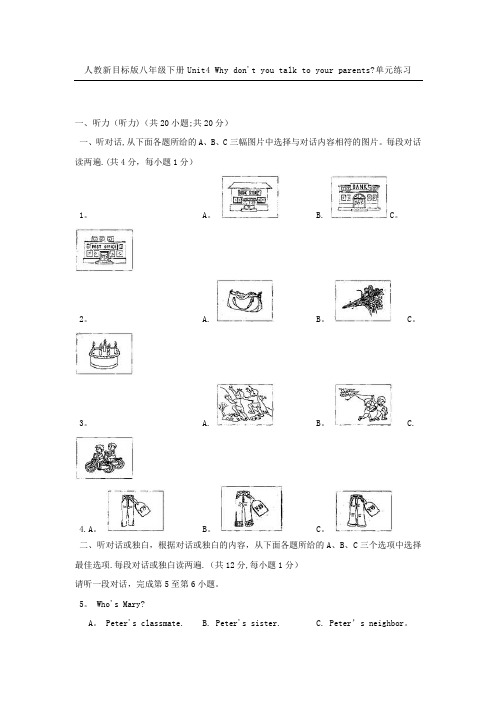
人教新目标版八年级下册Unit4 Why don't you talk to your parents?单元练习一、听力(听力)(共20小题;共20分)一、听对话,从下面各题所给的A、B、C三幅图片中选择与对话内容相符的图片。
每段对话读两遍.(共4分,每小题1分)1。
A。
B. C。
2。
A. B。
C。
3。
A. B。
C.4. A。
B。
C。
二、听对话或独白,根据对话或独白的内容,从下面各题所给的A、B、C三个选项中选择最佳选项.每段对话或独白读两遍.(共12分,每小题1分)请听一段对话,完成第5至第6小题。
5。
Who's Mary?A。
Peter's classmate. B. Peter's sister. C. Peter’s neighbor。
6. What does Mary’s brothe r teach?A. Japanese。
B. English. C。
Chinese。
请听一段对话,完成第7至第8小题。
7。
Where does the boy want to go?A. The museum.B. The cinema.C. The shop.8. What time will the boy meet his friends?A。
At 7:30。
B。
At 5:30. C。
At 3:30。
请听一段对话,完成第9至第10小题。
9. Why does the boy look unhappy?A。
He has to write a paper。
B. He has to take a history class.C。
He has to repair his computer.10。
What's the most important invention for the girl?A。
Clocks。
B。
Computers. C。
人教新目标八年级英语下册人教版八下英语Unit_4Why_don't_you_talk_to_your_parents
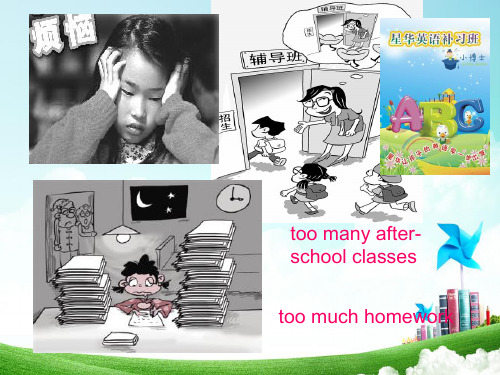
What’s wrong with Peter?
Listen. Peter’s friend is giving him 2a advice. Fill in the blanks with could or should.
Advice 1. You _______ could write him a letter. ( ) 2. You _______ ) should call him up. ( should talk to him so that you can say you’re 3. You _______ sorry. ( ) could go to his house. ( 4. You _______ ) 5. You _______ ) could take him to the ball game. (
too many afterschool classes too much homework
Learning aims
• 1. Master the words and phrases: allow (allow sb. to do sth.), wrong (What’s wrong), midnight (until midnight), look through, guess, deal (a big deal), work out • 2. By using “What’s wrong? Why don’t you...”, 讨论问题并给出建议 Eg: A: What’s wrong? B: I’m really tired because I studied until midnight last night. A: Why don’t you go to sleep earlier this evening.
- 1、下载文档前请自行甄别文档内容的完整性,平台不提供额外的编辑、内容补充、找答案等附加服务。
- 2、"仅部分预览"的文档,不可在线预览部分如存在完整性等问题,可反馈申请退款(可完整预览的文档不适用该条件!)。
- 3、如文档侵犯您的权益,请联系客服反馈,我们会尽快为您处理(人工客服工作时间:9:00-18:30)。
Section A 3 (Grammar Focus-4c)
一、教学目标:
1. 语言知识目标:
1) 学习掌握下列词汇:copy, return
2)进行一步复习巩固学习Section A 部分所学的生词和词组。
3)对询问困难及提出的建议的句型,掌握其规则。
4) 通过不同方式的练习,来熟练运用询问及提建议的表达方式。
2. 情感态度价值观目标:
让学生了解每个人在生活中都有可能遇到一些挫折和不幸,我们多去向那些不幸和困难的人们多表示自己的爱心,多去理解和帮助他们,多向他们提出解决问题的建议而不是去嘲笑他们。
二、教学重难点言
1. 教学重点:
1) 复习巩固Section A 部分所学的生词和词组,达到熟练运用的目标。
2) 熟练掌握和运用询问困难和提建议的表达方式。
2. 教学难点:
1) 总结询问问题和提出建议的句型,掌握规则。
2) 练习运用所学的句型。
三、教学过程
Step 1 Warming- up and revision
1. Have a dictation of the new words learned in the last class.
1.make sth. clear (同义词) ___________
2.talk (同义词) _______________
3.not allow (同义词) ______________
4.worried (同义词) ______________
5.get along with (同义词) ____________
municate (名词)_____________
7.old (比较级) _______________
2. Check the homework.
3. Let some Ss read the article in 3a. Then finish the short passage about Sad and Thirteen. (见课件)
1. Sad and Thirteen has some _________. He can’t __________his family. His parents _____ a lot. It’s the only _____________ they have. When they _____, it’s like a big black cloud ____________their home. He doesn’t like it.
His brother always watches whatever he wants until midnight. He _______ to let him watch his favorite TV show. So He always feels ______ and ________ at home.
2. Robert Hunt thinks Sad and Thirteen should _________ these feelings to his family. He should ____ to help. Maybe he _________ _____ jobs around the house so that they have more time _______________________. Second, he could sit down and
____________ ____ his brother. He could ________ that he _________ him watching TV
all the time, however, he should let him watch his _____________.
Step 2 Grammar Focus.
1. 学生阅读Grammar Focus中的句子,然后做填空练习。
① 你看上去很疲劳,怎么了?
You ____ tired. What’s _____ _______?
② 昨晚,我一直学习到午夜,因此我没有睡足觉。
I studied _____ _________ last ni ght so I didn’t ___ ______ sleep.
③我应该做什么? ________ ____I do?
你为什么不忘掉此事呢?尽管她错了,但那不是一件大事。
_____ ____ you forget about it? ______ she’s wrong. It’s not _____ _____
______.
④他应当如何做?
_______ _______ he do?
⑤他应当和他的朋友交谈一下,以便于他能向他道谦。
He _____ _____ _____ his friends ____ ___ he can say he’s sorry.
⑥ 或许你应当去他家。
_______ you ______ go to his house.
⑦ 我想我可以,但是我不想让他吃惊。
I think I _______, but I don’t want to _______ _________.
2. 学生们根据记忆,看大屏幕来完成填空练习。
3. 学生们完成填空试题后,可以打开课本检查答案,对错误的句子,单独进行强化记忆。
Step 3 Try to Find
一、提出建议
1.掌握提出问题的方法,
What’s wrong?
What’s the matter? with sb.
What’s the problem/the trouble?
并能讨论所给出的建议。
情态动词should, should等
should,shouldn’t “(不)应该”,常用来提出请求和建议
could “可以”可也用来给出建议。
表建议的句型:
➢You should/could +v.
➢Why don’t you + v.?
➢ Why not + v.?
➢ Could you please + v.?
➢You’d better (not) + v..
➢Would you mind doing……?
➢ What about/How about + n./doing……?
Exercise:
一、用所给单词的适当形式填空
1. We shouldn’t_______ (argue) with our parents.
2. You shouldn’t____ (use) the phone in the classroom.
3.—could I use your dictionary?
—well, you___.
A. can
B. could
C. should
D. might
4.you’d better___(go) to school by bike.
5.How about_________(go) hiking this afternoon?
Step 4 New Words
Look at the big screen and learn the new words and expressions:
1. copy v.复制;复印
It’s not good habits to copy other’s homework.
抄袭别人的作业不是好习惯。
2. return v.回来;回去
They didn’t return until yesterday afternoon. 直到昨天下午他们才回家。
Step 5 Practice
Work on 4a:
1. Fill in the blanks with although, so that or until.
2. 方法指导:
1. so that; 点拨:so that 意为“因此”,引导目的状语从句,表示前一句所表述的动作的目的。
在从句中常使用can/could/will/may/should等词。
拓展:so… that… 意为“如此……以至于”,常用于结果状语从句,表示上文动作所产生结果。
2. 点拨:though 意为“尽管……但是”,不能说,though…but。
句意“尽管你现在没有朋友,但不久你就会有朋友的。
”
3. 点拨:until 用于否定句中,表示句子的动作直到until短语所表示的时间才开始发生,即表示动作的起点。
一般译为“直到……才”。
4. 点拨:句意“尽管他是你的最好的朋友,但你还是应当告诉他,抄袭别人的作业是不对的。
”,可知空格处应用though 。
Step 6 Giving advice.
Work on 4c.
1. 让学生们阅读表格中的问题,明确每个问题的意思,为进行讨论做好准备。
2. 和同学们讨论一下如何解决这些问题,或某个问题。
3. 找到一个较为合理的建议。
4. 最后,向同班同学们展示自己的想法建议。
Homework
用下列词组造句
put up, hand out, call up, cheer up, come up with, give out, put off。
